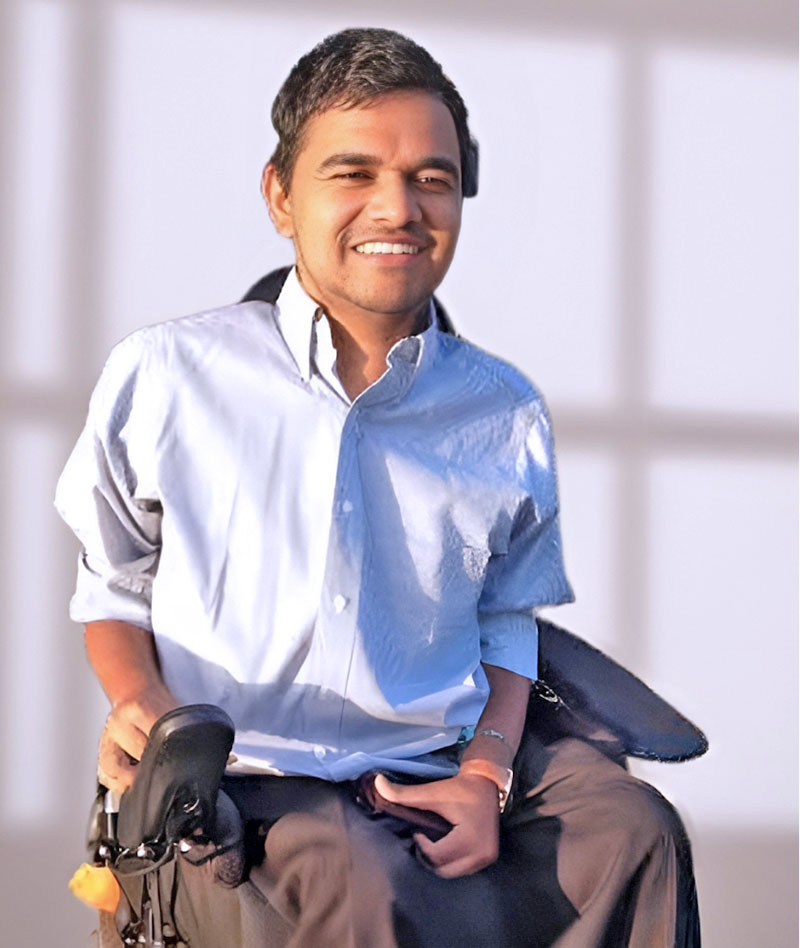Social Security makes every effort to ensure that any information published is accurate and up to date, but some information on this webpage may be historical.
Kushal's Success Story
Published in 2024
“I’ve Earned This”
Kushal’s Journey to Financial Independence
 As Kushal made his “to-do” list for the day, he reflected on how far he had come. In addition to managing a significant physical disability, he navigated a way to keep his health care benefits as he progressed in his career and increased his income. His story reflects 10 years of learning, persistence, hard work and support from service providers and employers that led him to achieve his educational, employment and financial goals.
As Kushal made his “to-do” list for the day, he reflected on how far he had come. In addition to managing a significant physical disability, he navigated a way to keep his health care benefits as he progressed in his career and increased his income. His story reflects 10 years of learning, persistence, hard work and support from service providers and employers that led him to achieve his educational, employment and financial goals.
Kushal was diagnosed with a type of muscular dystrophy as a child and received Supplemental Security Income (SSI) and Medicaid. According to the Center for Disease Control1, muscular dystrophies are a group of muscle diseases. Over time, muscle weakness decreases mobility, often profoundly.
Kushal explains, “It affects everything to do with mobility and self-care. I need my wheelchair to get around. I can’t walk or stand at all. I’m reliant on other people for my personal care. Even simply lifting my arm to my face or bending down, anything like that…. I’m restricted to moving my hands and arms a little bit. My mobility is limited to using a laptop or phone.”
1About Muscular Dystrophy | Muscular Dystrophy | CDC
Education was a Key to Employment
Education was particularly important to Kushal and his family. “My family never told me I couldn’t do something academically. Even at the schools I went to, the teachers didn’t expect less of my academic performance because of my disability.” In 2012, Kushal completed his Bachelor of Arts in Psychology at the University of Illinois, Urbana-Champaign, and decided to continue his education there. His goal was to earn his Master of Arts in Social Work, but he knew he would need financial assistance.
In 2013, Kushal connected with his State Vocational Rehabilitation (VR) agency for assistance. The agency helped him pay for graduate school. During his graduate program, he explored different areas of social work, and completed an internship at a drug rehabilitation psychiatric facility.
“My internship supervisor at the psychiatric facility at one point told me…that her mother had multiple sclerosis and that’s why she wanted to give me a chance. She felt like she understood what my challenges may be, and she wanted to give someone with those kinds of challenges an opportunity. Having her level of understanding about my situation made a huge difference.”
Time to Get to Work
After graduating with his master’s degree in 2016, Kushal started a part-time job at CompPsych as a mental health crisis counselor. However, given the two-hour commute involving both train and bus trips, Kushal asked his employer if he could work from home. Kushal needed this accommodation to stay with ComPsych. A reasonable accommodation is any change in the work environment or in the way things are customarily done that enables a person with a disability to attain the same level of performance or to enjoy the benefits and privileges of employment equal to those enjoyed by employees without disabilities. His employer agreed and this accommodation allowed him to work from home for the next two years.
Learning about Work Incentives
In 2021, Kushal increased his work hours to full time. However, with the increase in his income, he became concerned about losing his health care benefits. He again turned to his VR agency for help.
Kushal’s VR counselor told him about a Social Security Work Incentive that would allow his Medicaid coverage to continue, even if his earnings from work became too high for an SSI payment. This Work Incentive, Continued Medicaid Eligibility (or 1619(b)), allowed Kushal to continue employment without worrying about the sudden loss of Medicaid, which he depended on for costly personal care attendant services, and durable medical equipment.
One of the qualifications for this Work Incentive was that his gross earned income (earnings before taxes and other deductions) be below his state's threshold of eligibility. His earnings were below the state’s level, for a while. However, as he continued full-time work, he received a raise and was faced with his income going above the state income threshold. Kushal was at risk of his Medicaid being terminated, again.
“My Medicaid is vital. It pays for my care but also pays for my waiver services. The most expensive thing is the personal care attendant services. I also have a CPAP machine for respiration, my medicines, the wheelchair… and I couldn’t risk my life for work.” Kushal decided to take a break from work, regroup and find more options to stay employed. Kushal needed guidance, and fast.
Discovering the Ticket to Work Program
 In 2022, Kushal decided to explore Social Security’s Ticket to Work (Ticket) Program that he’d learned about previously from his VR counselor. The Ticket Program is a free and voluntary program that supports career development for people with disabilities who want to work. Adults ages 18 through 64 who receive Social Security Disability Insurance (SSDI) or Supplemental Security Income (SSI) qualify.
In 2022, Kushal decided to explore Social Security’s Ticket to Work (Ticket) Program that he’d learned about previously from his VR counselor. The Ticket Program is a free and voluntary program that supports career development for people with disabilities who want to work. Adults ages 18 through 64 who receive Social Security Disability Insurance (SSDI) or Supplemental Security Income (SSI) qualify.
Ticket Program service providers (including Kushal’s VR agency) offer a variety of employment support services. Program participants may also choose to work with providers known as Employment Networks (EN). The program’s goal is to help each participant over time to the extent they are able, and replace their SSDI benefits or SSI payments with earnings from work, which may include self-employment.
Kushal then connected with Full Circle Employment Solutions (Full Circle), a Maryland-based EN that provides career services virtually and in person. Kushal explained to his career counselor that the raise he received put him over the state Medicaid threshold, and he had to stop working to continue receiving healthcare benefits. His counselor started problem solving, and Kushal decided to return to work part time with ComPsych to maintain his professional skills and earn some money.
Kushal’s EN shared that there is a special way to calculate the earnings threshold for Continued Medicaid under the 1619(b) program. Social Security can determine an Individualized Medicaid Threshold amount if the person meets certain criteria, such as having a personal care attendant whose pay is publicly funded or having medical expenses above the average state amount. Thanks to this Work Incentive, Kushal’s calculated threshold is based on his individual situation and expenses.
This special rule allows Kushal to keep his Medicaid even though his earnings are above his state’s threshold. This rule can be extremely useful for people with medically complex disabilities requiring higher than average Medicaid costs. Full Circle worked with Social Security to determine Kushal’s Individualized Threshold, and he was able to pursue full-time work again, and keep his crucial health care benefits!
Experience Results in a New Opportunity
Kushal’s part-time work as a mental health crisis counselor began to be emotionally draining. He knew it was time to look for something that was less stressful and a better fit as he pursued full-time work again. He discussed his desire to explore new careers with his counselor at Full Circle.
The counselor conducted a baseline review of Kushal’s skills and interests. His counselor noticed how Kushal’s own experiences and education had made him well versed and highly knowledgeable about disability benefits. The counselor asked him if he wanted to apply for a full-time position as a Benefits Counselor at Full Circle’s sister company, Infinity Support Services. After some thought, Kushal decided this would be a great opportunity and applied for the job.
Kushal accepted a full-time offer in February of 2023 as a Benefits Counselor. His SSI payments soon ended due to his earnings from work, but his Medicaid stayed in place. Kushal believes that full-time employment has had a positive effect on his life.
“I think I gain a sense of autonomy and agency from working. I like to be self-reliant. I don’t like to ask others for money. Working just adds to your self-confidence. I did this for myself. It adds a level of happiness to your life, joy to your life when you buy something for yourself vs. someone buying something for you. There’s a big difference. I earned this. I worked hard for this. Earning things makes me happy.”
To learn more about the Ticket to Work Program, call the Ticket to Work Help Line at 1-866-968-7842. For callers who are deaf, hard of hearing, or have a speech disability, call 1-866-833-2967 (TTY). Hours are Monday through Friday, 8 a.m.- 8 p.m. ET; or visit https://choosework.ssa.gov.